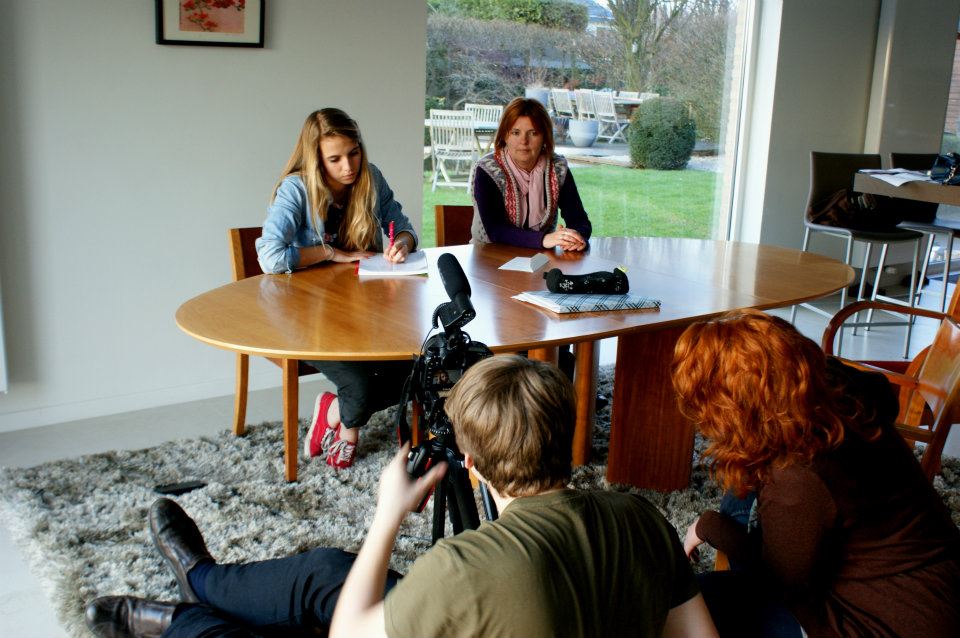|
With a big interest in both cinema and psychology I like to watch (and make) movies with a therapeutical approach or just a certain storyline or main character that can help the audience cope with their own problems. In this article I would like to explain how I learned about cinematherapy, what it is and how it actually works. How I learned about cinematherapyMy second shortfilm, "Wie Altijd Alleen Staat" (Dutch for 'Who Always Stands Alone'), in the first year of my studies at the RITCS was labelled a 'therapeutical film' by the jury. This movie was about a woman who was bullied in her youth and has therapy every week now to talk about it and to find out why it still bothers her so much after all these years. We see flashbacks of her childhood alternating with the conversations at the psychologist. I uploaded this shortfilm on YouTube and I got a lot of positive reactions, because many people could recognize themselves in it. In the second year of my studies, in 2012, I made a shortfilm, 'Papa' (Dutch for 'Daddy'), about parental alienation. It was about a girl who feels forced to hate her father, just to get some love from her mother. When this was finished and ended up on the internet, I got a lot of comments from people who were so grateful that I made a movie about this. They felt understood (the parents who were ostracized by their child, by manipulation of the other parent) and used the movie to get more attention and recognition for their difficult and misunderstood situation. In that same year at the RITCS in Brussels, I wrote a paper about therapeutical films and what cinematherapy actually is and why it can be so helpful for so many people. You could say that all films can work as a therapy, but in my opinion it's very important that therapeutical films are not just meant for escapism, like most of the Hollywood films are (especially action-, horror- and comedymovies). To me it's important that the film confronts you with your own problems and at the same time helps you find a possible solution or a way of dealing with it. Why films can teach you more about a problem than a website.You can read a lot about a particular disorder or psychological problem, but when you are watching a movie, you are carried away. You feel and experience with it, from the inside. This causes some stories to be a good input for (upcoming) therapists to delve into a specific problem. Also, films, books and plays offer comfort, recognition and insights for clients. The therapist may recommend such a book or movie, but it could also be used in, for example, a group therapy as a source of inspiration to discuss about. So, what exactly is cinematherapy?Cinematherapy is for everyone that's open to it. Anyone can learn what kind of effects movies can have on us and that it's very useful to watch a particular movie and knowing, in the back of your mind, that the movie can be lifechanging. We have to make use of all that film has to offer: the fantasy, the plot, the music. It can motivate and inspire us, exactly when we need it. An innovative method as film therapy is based on traditional therapeutic principles. Also if you're not visiting a therapist and you are not following certain guidelines for choosing a movie to watch, you can get much more out of a movie than just entertainment. Try to see the therapeutic value of a movie and you get inspired and motivated to do something about your problems or to just put things in a different perspective. Cinematherapy is not a very known method, but it is already applied by some therapists worldwide. Each client is different and is treated in such a way that works best for them. Why cinematherapy works.Most movies can serve as allegories, in much the same way as do stories, myths, fables, or dreams which can all be utilized in therapy. The cognitive effect of cinema therapy can be explained through recent theories of learning and creativity, which suggest that we have seven "intelligences" and the more of these intelligences we access, the faster we learn. Watching movies can engage all seven of them: the logical (plot), the linguistic (dialogues), the visual-spatial (pictures, colors, symbols), the musical (sounds and music), the interpersonal (storytelling), the kinesthetic (moving), and the intra-psychic (inner guidance). Many films contain a message that reminds us of our authentic self. Identifying with a character can help us to develop inner strength. Cinematherapy allows us to gain awareness of our deeper layers of consciousness to help us move toward new perspectives or behavior as well as healing and integration of the total self. This inner work is a form of "modern-day shamanism", where we find a way to our soul that makes sense to our mind. Just as in poems, music, and literature, studying film's symbolic and deeper meanings empowers us by helping to integrate emotions, intuition and logic, and therefore blend our rational and "irrational" processes. Understanding reactions to characters, who are "different" and unlikable can guide us to discover in the "shadow" of your own psyche our true self and our potential. As observing helps us to take a step back, the bigger picture becomes more obvious. This way, watching movies helps us learn to understand ourselves and others more deeply. We develop a skill to see our self and the world more objectively — with less of our habitual rigid, judgmental, or emotional filtering. Have you ever watched a movie and realised it helped you in a therapeutical way? :)
2 Comments
Kenan
8/11/2015 22:17:41
Very interesting! Never thought of films as a form of therapy! Maybe I'll watch some of the films you mention :-)
Reply
9/11/2015 10:18:57
Thank you! If you pay attention to what a film does to you, it can definitely help you with certain problems :)
Reply
Your comment will be posted after it is approved.
Leave a Reply. |
BLOGOn my blog I write about the process of improving my skills, about grabbing every chance I get to become more experienced and about learning from ups and downs. Besides that, I write about everything that inspires me, like film, photography, paintings and psychology.
x Iris Categories
All
Archives
April 2021
|
All rights reserved. No part of this site may be reproduced without permission.
BE 0696.668.648




